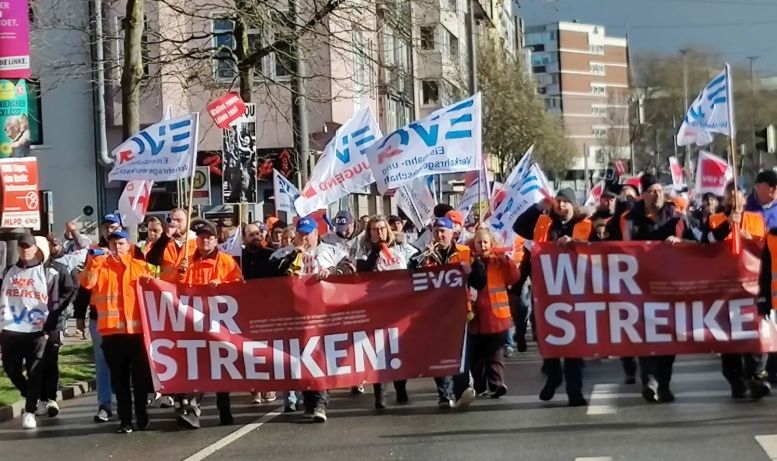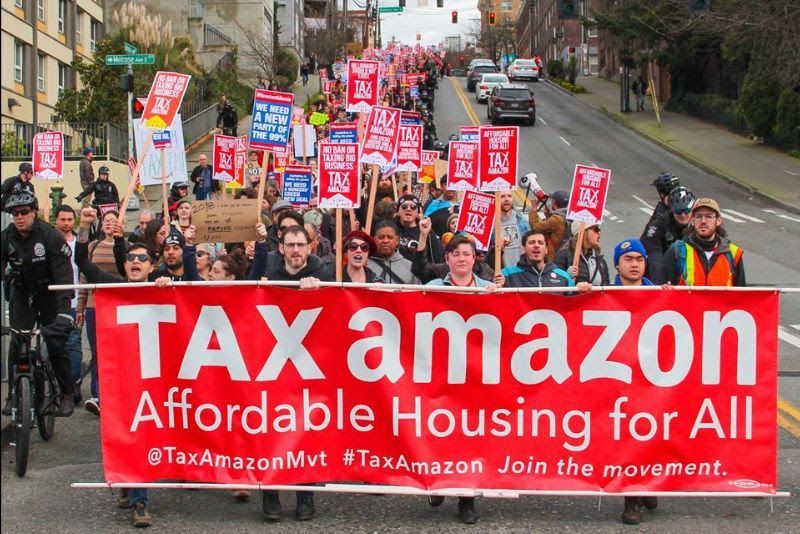On March 27, the trade unions launched a so-called “Megastreik”. Is this the beginning of a larger strike movement in Germany?
Since 2015, there have not been many large strike movements in Germany. For years, socialists and left-wing trade unionists have been looking with envy to France and the UK, wishing for a similar strike movement. Since the beginning of 2023, this wish might have come true: average inflation of about 8%, a somehow self-made labour shortage in some sectors, growing anger about large profits (especially in the privatised transport and parcel delivery sectors Deutsche Post and Deutsche Bahn), and a care crisis in hospitals and kindergartens. All have brought workers to the street and on the picket lines. In the first two months of this year alone, the service trade union ver.di recruited more than 65,000 new members.
The strike movement coincides with several larger bargaining rounds in different sectors. The largest is the public sector workers in the municipalities and the federal state. The service union ver.di demands a 10.5% wage increase and 500 euros more at least per month, which means up to 20% for the lowest-paid groups in the public sector. In this group are hospital nurses, kindergarten and social care workers but also public office workers of all sorts: airport and port workers, tunnel security, and communal transport workers such as bus and tram drivers.
The second bargaining round is the postal sector, which might have already come to a close — at the time of writing, there are still polls about a new agreement. Originally, ver.di demanded a 15% wage increase for one year but has since boiled it down to less than 11%. That said, the Deutsche Post made an 8.4 billion euros profit in 2022. Many postal workers are unsatisfied with the new offer.
Thirdly, the railway union EVG, right now is negotiating with the Deutsche Bahn about a 12% pay rise, while the Deutsche Bahn management agreed on a 14% salary increase for their own CEOs.
Political strike movement
Already on 3 March, the climate movement and the public transport workers (bus and trams) went on a joint climate strike. On 8 March, ver.di called the hospital nurses and kindergarten workers out to strike parallel to the feminist international women’s strike day. Political strikes are not officially legal in Germany; however, these were attempts to link the workers’ and social movements. On 22 March, another big strike day was organised in the public sector, which was so far the largest and most political strike day, with thousands of workers not just striking but joining demonstrations and picket lines in several hundred cities.
Mega strike day
On Monday, 27 March, ver.di and EVG, for the first time in their history, organised a coordinated strike. As ver.di wrote in their statement from 23 March: “This has never happened before in this way: In protest against insufficient offers in the collective bargaining disputes for the approximately 2.5 million employees of the federal government and municipalities and for the employees of companies of Deutsche Bahn AG, the members of the DGB mobility trade unions ver.di and EVG are jointly striking work next Monday (27 March) for the first time and thus sending a clear signal to the employers: ‘Together we can do more!’”
And indeed, German transport was paralysed. Hardly any plane, train, bus, tram or other forms of public transport moved. Freight ships were stopped, and tunnels closed down. For ver.di, this was an important message: The third bargaining round with the federal and municipal governments just began. It will last for three days. The ver.di leadership hopes to settle with a deal decent enough that workers will not demand a ballot poll for an indefinite strike. Therefore, they have invested a lot of energy in the “Megastrike” to make it the end point of a beginning strike movement.
However, many middle-range trade union secretaries and rank-and-file union members hope for a ballot and an indefinite strike to achieve more. In reality, the strike is not just on pay. It is about understaffing, burn-outs, and working conditions that endanger children in childcare, patients in hospitals, and passengers in trains and buses. It is an important movement that has already shown the potential to re-politicise a large part of the German working class. In some sectors, like airports, ports, and some railways, there had been no strikes for more than 30 years.
There is an enormous willingness to fight. Many colleagues say that the demanded 500 euro fixed salary for twelve months is already a minimum and that one must not go below it. Compensation in the form of a tax-free and contribution-free one-off payment is also unacceptable. Any such a one-off payment must come on top. But the fixed-wage increases of 500 euros must come now.
No rotten compromises
The postal sector bargaining round is an important marker for the public sector as a whole. Because even though 85.9% of postal workers voted for an indefinite strike, on the day of the ballot result ver.di immediately returned to the negotiation table, agreeing on an offer that has not been much better than the one workers just voted down. That is a warning to the public sector workers who are in the same trade union. Many colleagues at the Postal Service are dissatisfied, and there are many petitions among workers to vote for “No” and return to the picket lines for a better offer. The ballot on the acceptance of the result will take place up until 30 March. And although the media has already marked the postal bargaining round as a closed case, the outcome remains uncertain. However, the threshold for rejecting a deal in a union ballot is very high in Germany: more than 75% of workers have to turn it down, or else it will be accepted.
At the same time, the railway union EVG declared that the next strike dates will be after Easter, undermining the potential for increasing pressure and building a real strike movement now. About 30,000 railway workers and more than 120,000 public sector workers in 800 locations took part in the Megastrike. However, the speeches and activities were politically still far behind the already combative mood in the previous strike days of the public sector. Still, the climate movement, such as Fridays for Future, openly supported the Megastrike in return for the workers’ support of the climate strike in early March.
SAV members in Germany have been mobilising for and intervening in the current strike movement. We demand the full implementation of the demands, an escalating strike strategy towards an indefinite full strike and the building of delegation structures and strike committees at all workplaces. We fly-postered along the strike demonstration routes, intervened in protests and picket lines, collected signatures to support the strikes, sold our paper and were invited to speak at strike rallies. In the next few days, we will see if the strikes escalate further, as workers will vote down low offers, or if the trade union leadership will be able to cap the anger once more. Even then, SAV expects that other bargaining rounds, which are expected later this year, might still be escalating the mood further. The feverish statements of employer organisations to further “regulate the right to strike” might also point in that direction.



